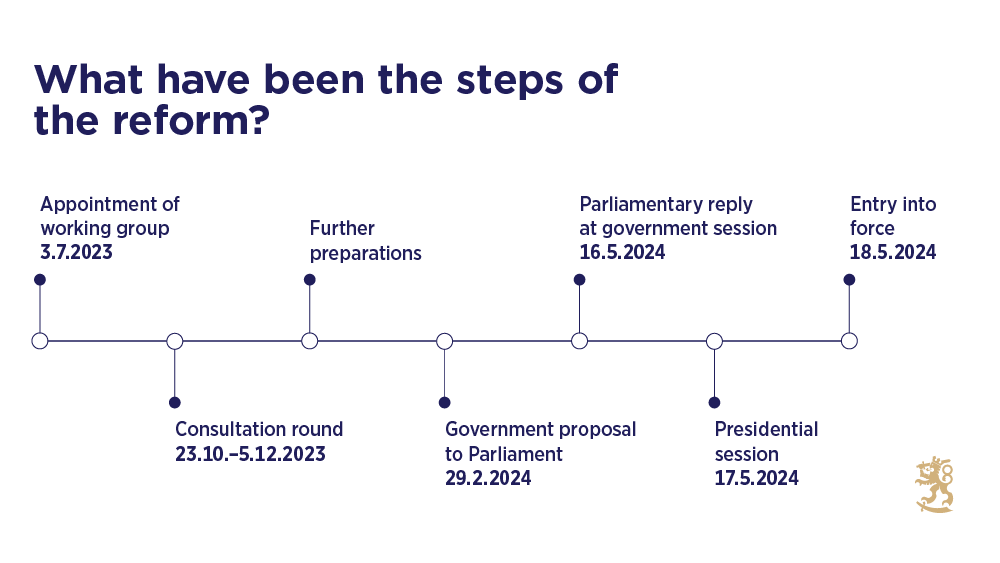Amendments to industrial peace legislation to enter into force on 18 May

The Government proposes that the President of the Republic approve the amendments to industrial peace legislation at the presidential session on 17 May 2024. The amendments would enter into force on 18 May 2024.
Improving industrial peace is one of the Government’s labour market reforms. Compensatory fines for violating industrial peace will be increased, disproportionate solidarity action limited and the length of political strikes restricted. The reform will not restrict industrial action aimed at improving working conditions in one's own collective agreement.
The aim is to reduce labour market disruptions. This will safeguard the productivity and better competitiveness of Finnish companies compared with key competitors and promote the image of Finland as a stable operating and investment environment abroad.
Compensatory fines for violation of industrial peace to rise
According to legislation, the obligation to maintain industrial peace applies when a collective agreement is in force. If the industrial action is directed at one’s own collective agreement while the agreement is in force, the strike is unlawful. A compensatory fine may be imposed for an unlawful strike.
The reform will raise the level of compensatory fines, setting the maximum amount at EUR 150,000 and the minimum amount at EUR 10,000. However, the level of compensatory fine can be reduced below the minimum amount or waived completely for a special reason.
Previously, compensatory fines have only been imposed on an association or employer that is party to a collective agreement and bound by the obligation of industrial peace. In future, an employee who continues a work stoppage which a court has found to be unlawful and who is aware of this judgment can be ordered to pay a compensation of EUR 200.
The provisions were further specified by Parliament to obligate the employer to inform the employee in writing that the court has found the work stoppage to be unlawful. The employer will be allowed to deduct the compensation from the employee’s salary only with the employee’s express consent. Otherwise, deduction will require that the employee, by final judgment, has already been ordered to pay the compensation.
Disproportionate solidarity action to be limited
Solidarity actions support the industrial action of another group of employees. The Government wants to impose restrictions so that, when the obligation to maintain industrial peace is in force, only such solidarity action that does not have disproportionately harmful consequences for third parties will be allowed.
Most solidarity action that has occurred in recent times will be permitted in the future too. The restrictions will be less severe if the collective agreement for the sector is not in force.
Limiting the length of political industrial action
A political industrial action refers to an industrial action implemented by an employee organisation and directed at a political decision-maker or decision-making. However, such action also has an effect on the employer. In future, the duration of political work stoppages will be limited to a maximum of 24 hours and other industrial action to a maximum of two weeks.
Parliament specified the provisions by adding a one-year time limit. Any political industrial action taken previously cannot be repeated within one year of the start of the original industrial action to achieve the same objective.
Duty to notify of industrial action to be extended
The obligation to notify about industrial action will also be extended to solidarity action and political industrial action organised in the form of work stoppages. In future, those organising solidarity action or political industrial action in the form of a work stoppage will have to notify about it no later than seven days before its start.
In the case of solidarity action, the notification must be submitted to the employer and the party to the collective agreement that is subject to the industrial action. In the case of political industrial action, when industrial peace is in force, the party to the collective agreement must be notified. Parliament specified that, in future, the National Conciliator’s Office must also be notified of any political industrial action or solidarity action.
Reform to enter into force on 18 May
The Ministry of Economic Affairs and Employment appointed a tripartite working group from 3 July to 15 October 2023 to prepare legislative amendments for implementing the Government Programme’s entries to improve industrial peace. The group was not unanimous in its work. The Ministry of Economic Affairs and Employment circulated the working group’s report for comments from 23 October to 5 December 2023.
The Government submitted its proposal on amendments to industrial peace legislation to Parliament on 29 February 2024. Parliament specified the provisions on the basis of the statement of the Constitutional Law Committee. Parliament also requires that the Government assess the gender impact of the legislative amendments and submit an assessment report to the Employment and Equality Committee by the end of 2027.
The Government discussed the parliamentary reply at its session on 16 May 2024. At the same time, it proposed that the legislative amendments enter into force on 18 May 2024. The President of the Republic is to approve the bills at the presidential session on 17 May 2024.
Inquiries:
Jukka Sarhimaa, Special Adviser to the Minister of Employment, tel. +358 295 047 330 (questions to the Minister of Employment)
Nico Steiner, Senior Ministerial Adviser, Ministry of Economic Affairs and Employment, tel. +358 295 049 001

